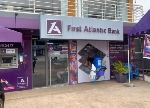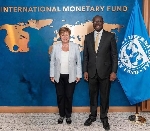NPA boss heaps praise on Finance Minister and BoG for stabilising Cedi, fuel prices
 Godwin Eduzi Tamakloe
Godwin Eduzi Tamakloe
Chief Executive Officer of the National Petroleum Authority (NPA), Mr. Godwin Kudzo Tameklo, has commended Ghana’s Finance Minister, Dr. Cassiel Ato Baah Forson, and the Governor of the Bank of Ghana, Dr. Johnson Asiamah, for implementing effective foreign exchange (forex) policies that have led to the relative stability of the Ghanaian cedi and a subsequent drop in fuel prices.
Speaking in an interview on the sidelines of a recent inter-agency dialogue organised by the Petroleum Hub Development Corporation in Accra, Mr. Tameklo praised the duo for their swift and prudent interventions in the forex market.
“I think I need to thank the Minister of Finance and the Governor of the Bank of Ghana for the work they are doing at the upper end, relating to the stability of the cedi.
The fuel market has witnessed relative stability,” he said.
The cedi has seen a notable improvement in recent months.
On February 5, 2025, the average interbank exchange rate stood at GH¢15.34 to the dollar, but by May 5, it had appreciated to GH¢13.68.
This currency stability, according to the NPA boss, has directly contributed to the drop in petroleum prices at the pump.
Mr. Tameklo highlighted the Bank of Ghana’s auctioning of forex to support petroleum imports as one of the effective measures driving down operational costs in the sector.
“If you monitor the market so far, I might say it has been relatively stable, and my prayer is that with one or two interventions we will be bringing onboard, it’s our hope that things become a bit more calm,” he said.
To further address structural challenges in the petroleum supply chain, the NPA CEO revealed plans by the government to construct a second Conventional Buoy Mooring (CBM) facility at the Tema Port.
This is expected to ease vessel congestion and reduce demurrage costs, which currently inflate fuel prices.
“We essentially have only one CBM. Many vessels spend time waiting at sea at a cost, and this cost eventually gets passed on to the final consumer,” he explained.
“It is estimated that we are losing about $35 million annually through demurrage.
Building a second CBM means multiple vessels can offload diesel, petrol, and LPG simultaneously, drastically reducing discharge time and associated costs.”
Mr. Tameklo also spoke on regulatory measures being implemented by the NPA to ensure integrity across the petroleum value chain.
He emphasised that the Authority has deployed trained inspectors across all regions to monitor compliance, maintain product quality, and guarantee consistent availability for consumers.
Source: Classfmonline.com/Cecil Mensah
Trending Business

New job creation is still not fast enough to absorb new entrants – Statistical Service
08:58
Employment up 330,000 by Q3 2025, unemployment averages 12.8% – GSS
06:57
GOLDBOD Jewellery unveils festive Christmas and New Year collections
18:17
Importers and Exporters Association kick against planned introduction of AI system at Ghana's ports
11:47
TDC unveils vision for Oxygen City development in Ho
09:59
First Atlantic Bank PLC marks major milestone with oversubscribed IPO and upcoming GSE listing
08:51
IMF unlocks US$380 million disbursement for Ghana under ECF
00:42
GIPC boss outlines government’s key economic priorities for 2026
15:40
GIPC call stronger investment partnership with Suriname
15:32
Non-performing energy sector heads to be sacked -Energy Minister warns
13:14




